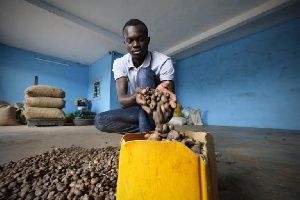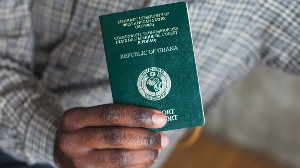Following the withdrawal of a directive by the Ministry of Trade and Industry that sought to ban the export of raw cashew nuts until June 2016, the commodity’s price has increased appreciably, Business and Financial Times has gathered.
Checks at the commodity’s market places around the Brong Ahafo Region revealed that a kilogramme of cashew is currently priced at GH¢4. Prior to the announcement of the ban by the ministry, the price was hovering around GH¢4 and GH¢4.50p, but reduced drastically to between GH¢2-GH¢2.50p after imposition of the ban.
Last week, the Trade Ministry announced a ban on the export of raw cashew nuts until May 31st 2016. The directive was meant to protect local processing companies from being starved of adequate supplies of the raw nuts. However, the directive was greeted with uproar and concerns from most actors in the cashew production value chain, hence revocation of the ban for further, broader consultations.
Cashew buyers and their agents withdrew their services which accordingly caused a shape decline in the commodity’s price within the space of few days. They have since resumed brisk business at places like Techiman, Sampa, Drobo, Wenchi and Jakekrom. Farmers on the other hand are also keen to sell off their stocks to avoid any market eventuality.
Drobo-based buyer Rexford Agyei, in an interview with Business and Financial Times commended government for its “swift response to the cry of many in the cashew production value chain”. He said: “I have thousands of tonnes in stock, and we are working around the clock to export it as soon as possible since the door is now open”.
Meanwhile, Chairman of the Techiman Cashew Buyers Association, Abdul Mumuni Issah, revealed that though buyers have resumed trading activities, some exporters and investors still habour some fear. “Some exporters and investors, especially those who trade with unlicenced local buyers and agents are apprehensive and sceptical about pumping more money into the business,” he said.
“Henceforth, many exporters and investors will explore other alternative routes in the West African sub-region for exporting cashew. The recent development might trigger smuggling of the commodity in the near-future, if ‘all-pleasing measures’ are not taken to address challenges facing the industry,” he stated
The National President of the Cashew Farmers Association, Anthony Kwaku Adu, on his part consequently advocated for massive investment into cultivation of cashew as the ‘best solution’ to bridge the deficit in production of raw cashew nuts in the country, which remains the industry’s major bane.
Business News of Tuesday, 29 March 2016
Source: B&FT Online













